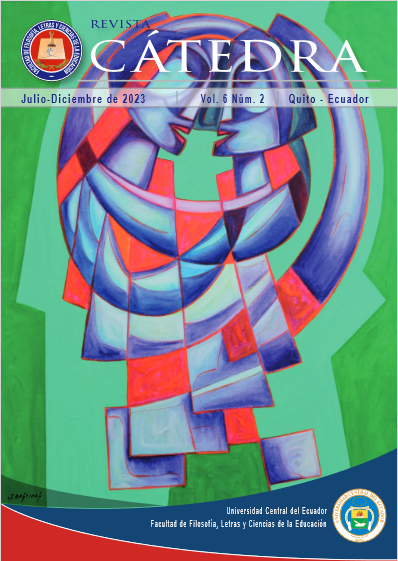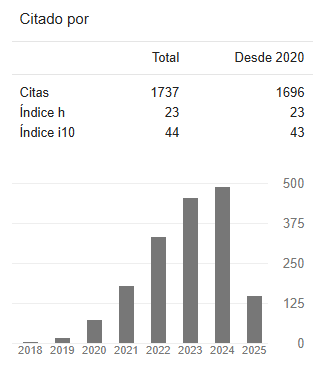Teaching competence in future Computer Science teachers in Ecuador
DOI:
https://doi.org/10.29166/catedra.v6i2.4636Keywords:
digital competence, teacher, covid 19, students, educational informaticsAbstract
The knowledge society and economy of the 21st century demand that students develop the necessary skills and abilities to face the requirements of adult life. Thus, future teachers of computer science secondary education in Ecuador, due to their technical-pedagogical training, face the challenge of developing the digital teaching competence to help their students to face the technological challenges that the current world demands. The present study aimed to diagnose and analyze the level of mastery in the 5 areas of digital competence in the students of the Pedagogy of Experimental Sciences of Computer Science at the Central University of Ecuador, through the application of a questionnaire created by professors Débora Martín Rodríguez, María Saénz, Raúl Santiago and Edurne Chocarro, professors of two renowned universities in Spain. In addition, the instrument was validated by local experts. To measure the reliability of the questionnaire, Cronbach's alpha coefficient was used for each dimension of digital competence in teaching, obtaining a score of over 0.90. The methodology used was empirical-analytical and descriptive, using a non-probabilistic sampling, at the convenience of the researchers, of 161 students of different levels and subjects. Among the main conclusions found were that the least developed areas of teaching digital competence are problem solving and safety.
Downloads
References
Bawden, D. (2002). Revisión de los conceptos de alfabetización informacional y alfabetización digital. Anales de documentación, 5, 361-408.
Cabero, J., y Llorente, M.C. (2006). La rosa de los vientos, Dominios tecnológicos de las TIC por los estudiantes. Sevilla: Grupo de Investigación Didáctica.
Cabero, J., Llorente, M., Leal, F., y Lucero, A. (2009). Enseñanza and Teaching. La alfabetización digital de los alumnos universitarios mexicanos: Una investigación en la Universidad Autónoma de Tamaulipas. Salamanca: Ediciones Universidad de Salamanca
Domingo-Coscolla, M., Bosco, A., Carrasco Segovia, S y Sánchez Valero, J. A. (2020) Fomentando la competencia digital docente en la universidad: Percepción de estudiantes y docentes. Revista de Investigación Educativa, 38(1), 167-782.DOI: http://dx.doi.org/10.6018/rie.340551
European Framework for the Digital Competence of Educators: DigCompEdu por el Centro Común de Investigación de la Comisión Europea. (2016). ISBN 978-92-79-73494-6, doi:10.2760/159770, JRC107466
European Parliament y Council (2006). Recommendation of the European Parliament and of the Council of 18 December 2006 on Key Competences for Lifelong Learning. Brussels: Official Journal of the European Union http://goo.gl/EuX6Wg
Ferrari, A. (2012). Digital competence in practice: An analysis of frameworks. Sevilla: European Commission, Joint Research Centre (JRC)
Gutiérrez, J., Cabero, J., Estrada, L. (2016). Diseño y validación de un instrumento de evaluación de la competencia digital del estudiante universitario. Revista espacios.
INTEF (2017). Instituto Nacional de Tecnologías Educativas y de Formación del profesorado. Marco Común de Competencia Digital Docente. Recuperado de https://aprende.intef.es/sites/default/files/2018-05/2017_1020_Marco-Común-de- Competencia-Digital-Docente.pdf
Ng, W (2012). ’Can we teach digital natives’ digital literacy, Computers & Education, 59, 3, 1065-1078 (online Elsevier SD Freedom Collection).
Ng, W (2012). Alfabetización digital. https://www.redalyc.org/pdf/659/65935862004.pdf
Martin R., Deborah & De Luis, Edurne & Campión, Raúl & Ocón, Magdalena. (2016). Diseño de un instrumento para evaluación diagnóstica de la Competencia digital docente: formación flipped classroom. Didáctica, Innovación y Multimedia (DIM), 1-15 https://dialnet.unirioja.es/servlet/articulo?codigo=5407952
Mon, F. y Cervera, M. (2013). Competencia digital en la educación superior: instrumentos de evaluación y nuevos entornos. Revista Venezolana de Información, Tecnología y Conocimiento, 10, 3, Universidad de Zulia, 29-43.
Prendes Espinosa, M. P., Gutiérrez Porlán, I., & Martínez Sánchez, F. (2018). Competencia digital: una necesidad del profesorado universitario en el siglo XXI. Revista de Educación a Distancia (RED), 18(56). https://revistas.um.es/red/article/view/321591
Rodríguez Peñuelas, M. A. (2010). Métodos de investigación. 1ra. Edición, México. Ed. Universidad Autónoma de Sinaloa.
Roig-Vila, R., y Moreno-Isac, V. (2020). El pensamiento computacional en Educación. Análisis bibliométrico y temático. Revista de Educación a Distancia, 20(63). doi: https://doi.org/10.6018/red.402621
Roig-Vila, R., y Urrea-Solano, M. E. (2020). Formación colaborativa en interculturalidad del profesorado de Educación Infantil y Primaria. Revista Caribeña de Investigación Educativa (RECIE), 4(1), 7-19. doi: https://doi.org/10.32541/recie.2020.
Rojas, J. (2020). Modelo flipped learning aplicado a la asignatura de sistemas operativos II de la carrera de informática de la UCE: estudio de caso para medir el nivel de motivación y satisfacción tecnológica en el uso de la plataforma Moodle (p. 1).
http://rua.ua.es/dspace/bitstream/10045/114854/1
Valdivieso Guerrero, T.S. y Gonzáles Galán, M.Á. (2016). Competencia Digital Docente: ¿Dónde estamos? Perfil del docente de educación primaria y secundaria. El caso de Ecuador. Pixel-Bit: Revista de Medios y Educación, 49, 57-73.









